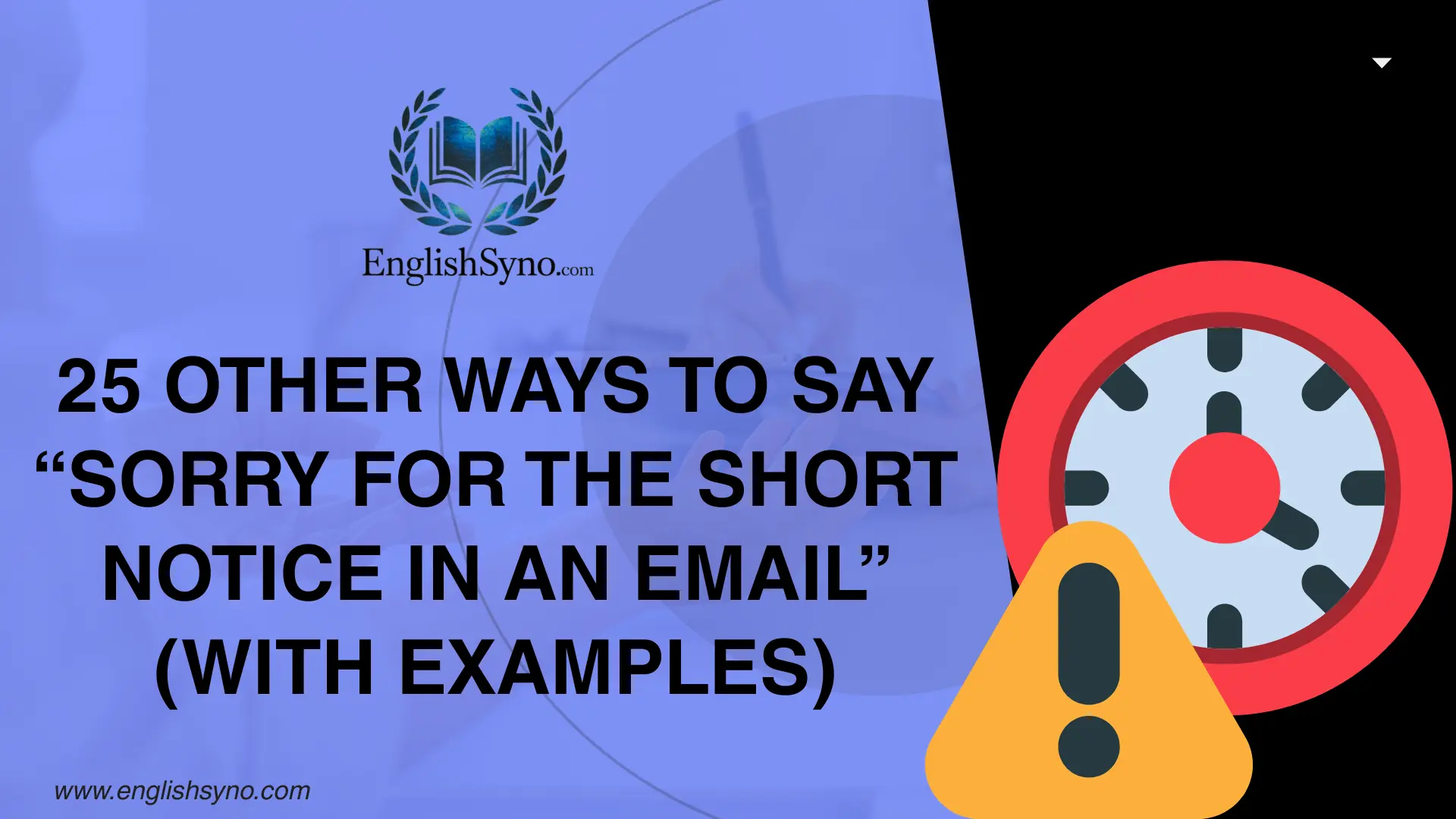When you need to apologize in a brief email for a last-minute request or change in plans, I always start with a direct apology like “Sorry for the short notice in an email,” then give a reason without excuses. This approach helps acknowledge the recipient’s time and inconvenience, showing empathy and respect, whether it’s a meeting, business appointment, or urgent request, making someone aware that they need to prepare for less-than-ideal timing.
It’s also key to propose the next step clearly. I ask the recipient to respond and provide information that is formal, polite, and easy to follow. Even for unexpected, rescheduling, or last-minute situations, consider the context and what fits the settings, advance notice expected, or deadlines involved. This ensures the apology is acknowledged, and the recipient understands the importance while maintaining personal and professional respect.
What Does “Sorry for the Short Notice in an Email” Mean?
When you write “Sorry for the short notice in an email,” you’re expressing a polite acknowledgment that your message, request, or update is coming at the last minute. It’s a way to show empathy, consideration, and professionalism, especially when the recipient has little time to prepare, respond, or adjust. This phrase recognizes the inconvenience caused and helps maintain respect in professional and personal communication.
When to Use “Sorry for the short notice in an email”
Use this phrase when making a last-minute request, rescheduling meetings, or sending urgent information. It works best in formal or semi-formal professional settings, where timing is important, and you want to acknowledge the recipient’s time and effort.
Is It Professional/Polite to say “sorry for the short notice in an email”?
Yes. When used appropriately, it is both professional and polite. Pair it with a brief reason or next step to ensure clarity. Avoid using it too often or for non-essential updates, as it can seem habitual rather than sincere.
Pros or Cons
Pros: Shows awareness, empathy, and respect; maintains professionalism; signals urgent importance.
Cons: Can seem repetitive if overused; may appear apologetic rather than solution-oriented if not paired with a next step or actionable request.
Apologies for the short notice
Meaning/Definition: A polite way to open an email acknowledging unexpected timing.
Example Email:
“Apologies for the short notice, but we need to schedule a team meeting tomorrow at 10 AM.”
Best Use: Formal, professional emails requiring immediate action.
Worst Use: Casual messages or trivial updates.
Tone: Polite, respectful, formal.
I hope this isn’t too inconvenient
Meaning/Definition: Expresses concern for the recipient’s time while delivering urgent information.
Example Email:
“I hope this isn’t too inconvenient, but can you review the report by this afternoon?”
Best Use: Friendly, professional emails; works well for semi-formal requests.
Worst Use: If the request is non-urgent or already planned.
Tone: Thoughtful, empathetic, considerate.
I regret the last-minute notice
Meaning/Definition: A formal acknowledgment of timing and apology for sudden changes.
Example Email:
“I regret the last-minute notice, but the client meeting has been moved to 3 PM today.”
Best Use: Formal professional correspondence; urgent schedule changes.
Worst Use: Informal notes or internal team updates without urgency.
Tone: Respectful, professional, apologetic.
Thank you for your flexibility
Meaning/Definition: Expresses gratitude for understanding unexpected changes.
Example Email:
“Thank you for your flexibility on such short notice regarding tomorrow’s call.”
Best Use: Polite follow-ups to last-minute requests.
Worst Use: When no flexibility is required.
Tone: Appreciative, respectful, warm.
I appreciate your understanding
Meaning/Definition: Acknowledges that the recipient may face inconvenience and expresses gratitude.
Example Email:
“I appreciate your understanding as we adjust the project deadline unexpectedly.”
Best Use: Formal or semi-formal professional emails.
Worst Use: Casual or non-urgent situations.
Tone: Respectful, professional, warm.
My apologies for the delay in notice
Meaning/Definition: Conveys a formal apology for providing information late.
Example Email:
“My apologies for the delay in notice, but the agenda has changed for tomorrow’s meeting.”
Best Use: Professional contexts where timing is critical.
Worst Use: Non-essential messages.
Tone: Polite, formal, apologetic.
I hope you can accommodate this change
Meaning/Definition: Requests understanding for an unexpected adjustment in the schedule.
Example Email:
“I hope you can accommodate this change, as the presentation has been moved up to 2 PM.”
Best Use: Professional or semi-formal emails requiring flexibility.
Worst Use: Trivial adjustments or routine updates.
Tone: Polite, considerate, empathetic.
Please forgive the short notice
Meaning/Definition: A formal appeal for understanding regarding last-minute updates.
Example Email:
“Please forgive the short notice, but the report needs your review by EOD today.”
Best Use: Formal correspondence with external stakeholders.
Worst Use: Internal casual communication.
Tone: Respectful, apologetic, formal.
I apologize for the rush
Meaning/Definition: Expresses regret for requiring immediate attention.
Example Email:
“I apologize for the rush, but can you send the files by 1 PM today?”
Best Use: Time-sensitive professional requests.
Worst Use: Non-urgent or optional tasks.
Tone: Polite, apologetic, professional.
Thank you for your quick response
Meaning/Definition: Shows appreciation for immediate action.
Example Email:
“Thank you for your quick response to the last-minute meeting request.”
Best Use: Follow-ups for urgent replies.
Worst Use: Casual or routine communications.
Tone: Appreciative, warm, professional.
Forgive the last-minute update
Meaning/Definition: A polite appeal to excuse unexpected information delivered at the last minute.
Example Email:
“Forgive the last-minute update, but the meeting location has changed to Room 405.”
Best Use: Formal or semi-formal emails; internal teams or external clients.
Worst Use: Trivial updates where timing isn’t critical.
Tone: Polite, respectful, professional.
Apologies for the late notice
Meaning/Definition: A direct acknowledgment that the recipient has less time than expected.
Example Email:
“Apologies for the late notice, but the presentation has been moved up to 9 AM tomorrow.”
Best Use: Professional urgent notifications.
Worst Use: Routine, non-urgent emails.
Tone: Formal, apologetic, considerate.
I’m aware this is short notice
Meaning/Definition: Shows awareness and consideration of the recipient’s limited preparation time.
Example Email:
“I’m aware this is short notice, yet we need to finalize the agenda today.”
Best Use: Professional emails requesting quick action.
Worst Use: Casual or non-essential requests.
Tone: Respectful, empathetic, polite.
Please excuse the short notice
Meaning/Definition: A Formal request for understanding about unexpected timing.
Example Email:
“Please excuse the short notice, but the client’s call has been rescheduled to this afternoon.”
Best Use: External stakeholders or formal professional communications.
Worst Use: Informal internal messages where urgency isn’t critical.
Tone: Polite, professional, apologetic.
I understand this is sudden
Meaning/Definition: Expresses empathy toward the recipient for an unexpected request.
Example Email:
“I understand this is sudden, but can we meet briefly to review the project updates?”
Best Use: Semi-formal emails requiring quick responses.
Worst Use: Routine or planned notifications.
Tone: Empathetic, polite, professional.
Thank you for your patience
Meaning/Definition: Expresses gratitude for understanding a last-minute change.
Example Email:
“Thank you for your patience regarding the urgent schedule adjustment.”
Best Use: Follow-ups after sudden requests.
Worst Use: Non-urgent communications.
Tone: Appreciative, respectful, professional.
Sorry to bring this up last minute
Meaning/Definition: Informal yet polite acknowledgment of timing pressure.
Example Email:
“Sorry to bring this up last minute, but we need your approval by noon today.”
Best Use: Semi-formal internal emails.
Worst Use: Very formal external communications.
Tone: Friendly, apologetic, polite.
Apologies for any inconvenience caused
Meaning/Definition: Recognizes the impact of sudden requests on the recipient.
Example Email:
“Apologies for any inconvenience caused by the rescheduling of tomorrow’s meeting.”
Best Use: Formal professional communications.
Worst Use: Casual or minor requests.
Tone: Formal, respectful, apologetic.
I realize this is last-minute
Meaning/Definition: Highlights awareness of short notice and consideration for the recipient.
Example Email:
“I realize this is last-minute, but could you review the document before 5 PM?”
Best Use: Semi-formal emails needing immediate attention.
Worst Use: Non-urgent emails.
Tone: Polite, empathetic, professional.
I appreciate your prompt attention
Meaning/Definition: Shows gratitude for immediate action on urgent matters.
Example Email:
“I appreciate your prompt attention to this last-minute request.”
Best Use: Urgent professional requests.
Worst Use: Routine or non-critical tasks.
Tone: Respectful, professional, appreciative.
Apologies for the unexpected notice
Meaning/Definition: A formal acknowledgment of sudden updates or requests.
Example Email:
“Apologies for the unexpected notice, but we need to finalize the agenda today.”
Best Use: Formal professional or external emails.
Worst Use: Internal casual notes.
Tone: Polite, professional, respectful.
Please bear with me on short notice
Meaning/Definition: Requests patience while handling last-minute matters.
Example Email:
“Please bear with me on short notice as I adjust the meeting schedule.”
Best Use: Semi-formal internal or team communications.
Worst Use: External formal stakeholders unless necessary.
Tone: Polite, friendly, empathetic.
Thank you for accommodating this
Meaning/Definition: Shows gratitude for accepting unexpected changes.
Example Email:
“Thank you for accommodating this last-minute adjustment to the project plan.”
Best Use: Professional communications after sudden updates.
Worst Use: Non-urgent situations.
Tone: Appreciative, professional, respectful.
I hope this works for you
Meaning/Definition: A polite check that the recipient can accept last-minute changes.
Example Email:
“I hope this works for you, but we need to move the meeting up to 2 PM.”
Best Use: Semi-formal emails; checking feasibility.
Worst Use: When changes are fixed without flexibility.
Tone: Polite, considerate, professional.
Thanks for your understanding on short notice
Meaning/Definition: Expresses gratitude for the recipient’s understanding regarding last-minute changes.
Example Email:
“Thanks for your understanding on short notice, I truly appreciate your support.”
Best Use: Professional and semi-formal emails.
Worst Use: Informal or casual messages where timing isn’t critical.
Tone: Appreciative, warm, respectful.
Final Thoughts
Mastering how to say “sorry for the short notice in an email” effectively can transform your professional communication. Using the right words conveys empathy, respect, and consideration for the recipient’s time and schedule. Whether it’s a last-minute request, a meeting change, or an urgent update, the alternatives we explored allow you to express regret without diminishing professionalism. Phrases like “I appreciate your understanding” or “Thank you for your flexibility” not only soften the impact of unexpected updates but also foster positive relationships and a collaborative work environment.
In practice, pairing your apology with a brief explanation, proposed next steps, or solution-oriented guidance demonstrates responsibility and thoughtfulness. These approaches are especially useful in business emails, team communications, and interactions with clients where maintaining professionalism is crucial. Using a polite, formal, or semi-formal tone ensures clarity while avoiding miscommunication or perceived negligence.
Ultimately, consistently choosing empathetic phrasing strengthens your credibility and nurtures trust. Each alternative we presented can be adapted to context, urgency, and the recipient’s expectations. Remember, a well-crafted short notice apology is not just about saying sorry-it’s about respecting others’ time, acknowledging inconvenience, and guiding next steps professionally. By integrating these strategies into your writing, your emails become more effective, considerate, and memorable.
FAQs
What does “sorry for the short notice in an email” mean?
It’s a polite acknowledgment that the recipient has limited time to respond or prepare, showing empathy and consideration.
When should I use this phrase?
Use it for last-minute requests, meeting changes, or urgent updates in professional emails.
Is it professional to say this?
Yes, it is polite, formal, and shows respect for the recipient’s time.
Can I make it sound more personal?
Yes, pair it with gratitude or empathy phrases, like “I appreciate your understanding.”
What is the best alternative phrase?
Alternatives include “I regret the last-minute notice” or “Thank you for your flexibility,” depending on context.
How long should the apology be?
Keep it brief but clear, ideally one or two sentences, followed by the reason or next step.
Should I explain the reason for the short notice?
Yes, a concise reason enhances credibility and shows thoughtfulness.
Can I use it for internal team emails?
Absolutely, especially for rescheduling or urgent requests, while keeping the tone professional.
How do I maintain professionalism?
Use formal language, polite phrasing, and avoid unnecessary excuses.
Are informal alternatives acceptable?
Yes, for internal communications, like “Sorry to bring this up last minute,” while still being polite.
Should I propose next steps?
Always. It shows responsibility and helps mitigate inconvenience.
Can this phrase be overused?
Yes, frequent use may seem habitual. Only use for urgent or unavoidable situations.
How to express empathy effectively?
Acknowledge inconvenience, thank the recipient, and offer solutions or guidance.
Is it okay to combine alternatives?
Yes, for example: “Sorry for the short notice and thank you for your flexibility.”
Does using this phrase improve relationships?
Yes, it builds trust, shows respect, and communicates professionalism, especially in time-sensitive contexts.

Muhammad Altaf is an English language specialist and professional content strategist with over 10 years of experience writing and teaching practical English usage, professional communication, and tone awareness. His work focuses on helping readers express ideas clearly, naturally, and confidently in real-world contexts.


